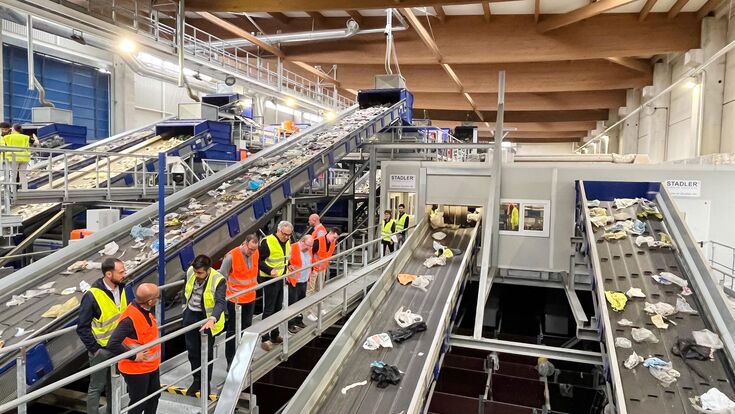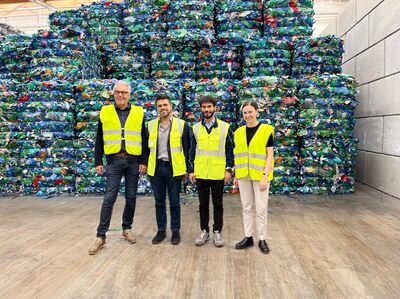Circular Plastic : The innovative sorting plant designed by STADLER closes the plastic circular economy loop in Turin

Circular Plastic sorting plant in Turin, Italy designed and built by STADLER
- © STADLEROn the 20th of September, Iren and STADLER welcomed a group of selected customers and international press to their state-of-the-art Circular Plastic Sorting facility in Turin, Italy. Hosted by the management teams of both companies, the event included a presentation of STADLER's innovative solutions, followed by an informative tour of the facility.
Iren SpA, the leading multi-utility company in north-west Italy, is committed to a sustainable development model. It is one of the country's main operators in the fields of electricity, gas, district heating, management of integrated water and environmental services and integrated energy efficiency solutions. Through its environmental management company, Iren Ambiente, it plays a leading role in the circular economy, transforming waste into resources for the territory, closing the loop.
Iren relied on STADLER's expertise for the design and installation of its Circular Plastic Sorting Plant - the largest in Italy. Located in Borgaro, near Turin, the new plant has an annual capacity of 100,000 tonnes. It integrates innovative solutions and advanced technologies to automatically sort 17 types of polymers and plastics, aluminium and ferrous materials, ensuring maximum operational flexibility. The process provides a high quality output and returns up to 80% of the input materials to the recycling loop.
This is the latest project in a successful collaboration between Iren and STADLER: “We are proud to be Iren’s supplier,” says Paolo Cravedi, Senior Project Manager at STADLER. “We started with a small project in 2020, then went on to work together on Iren’s WEEE plant in Volpiano, its plastic recycling plant in Pianezza and the ReCap facility in Parma, which processes both plastics and cardboard. We also designed and built the Valterza plant in Asti, which sorts mixed plastic waste made up of mainly bottles and films.”
“We know STADLER well and we appreciate their excellent organization, high reliability, and the precision with which they execute all projects,” comments Ing. Flaviano Fracaro, Technical Director at Iren Ambiente. “Equally important for us is the quality and reliability of their products: in our experience, all installations have gone into production on schedule, with short start-up periods, and deliver excellent performance, minimizing issues and downtime.”
Innovative solutions for high quality output and recovery rates
The Circular Plastic plant starts the process by separating the incoming material into three streams: bulky, medium and fine.
The bulky material is screened with a special model of the STADLER STT5000 ballistic separator, which ensures a better separation of the film, and then separated in a sorting cabin.
A special feature of the plant is the line dedicated to the fines after they have been separated by a STADLER drum screen and ballistic separators. On this line, the fines pass through a magnetic separator and an eddy current system to remove all ferrous material and aluminium, then through a STADLER trommel screen and two optical separators to recover small plastic components such as bottle caps and other valuables.
The medium material is split into two lines, each with a STADLER STT5000 ballistic separator to sort the 2D and 3D material, while the fines are sent to the dedicated fines line. The 2D stream passes through 6 optical separators to sort film into PP, PE and bio-film.
The 3D stream is cleaned of ferrous materials and then separated by optical sorters into clear PET, blue PET, coloured PET, opaque PET and trays. Further optical sorting provides additional automatic quality control and cleaning of these primary products. In parallel, HDPE, PS and PP fractions are sorted on a second line. The output of the two 3D lines is combined for the extraction of clean aluminium particles.
All residual materials from the 2D and 3D lines go through a second sorting process and are fed into optical sorters to recover any remaining valuable materials, which are sent to an advanced bottle recovery line, which is another outstanding feature of the Circular Plastic plant. It is equipped with a bottle opener, a dedicated ballistic separator and a material metering system to ensure maximum recovery.
User-friendly, efficient operation and maintenance
STADLER's innovative approach includes the use of technologies that facilitate the operation and maintenance of the plant, as well as the comfort of the operators.
An advanced load cell system has been installed to monitor the amount of incoming material and the amount of different materials stored in the bins ready for baling. This allows the operator in charge of the balers to know exactly how much material is in each bunker and to produce a precise number of bales for each product.
A new local maintenance system provides operators with a mobile panel that they can plug into any section of the plant to control all the machines in that section. Detection sensors on the motors facilitate data collection and analysis for preventive machine maintenance. In addition, the entire plant can be monitored remotely with dedicated software that collects and records more than 1,000 signals simultaneously to generate periodic reports valuable for predictive maintenance.

The sorting cabin is equipped with an efficient air conditioning system that maintains a comfortable working environment all year round, providing 10 air changes per hour with fresh air from outside.
“Circular Plastic is a truly impressive facility with all its machines and optical sorters,” says Flaviano Fracaro. “What we appreciate most is the layout's space management, with walkways that make all the machines accessible and the entire plant easy to navigate, ensuring excellent access for maintenance. Additionally, thanks to the various management systems for operators, it is very easy and intuitive to control and manage the entire facility.”
STADLER’s holistic approach – key to the success of a complex project
The Circular Plastic project presented challenges at every stage that required STADLER’s extensive experience – from designing to ensuring effective communication across all parties involved in the implementation, all the way to final tests and commissioning to ensure the plant operates as required to deliver the desired consistent high quality.
“In the design stage, we had to study how to optimize space and distance to assemble all the machines in the building allowing for future maintenance and upgrading,” explains Paolo Cravedi. “Then, during the assembly phase, the challenge was coordinating more than 100 people from 20 companies to assemble the plant and all auxiliary systems. Finally, once the plant was assembled, we had to ensure it could manage the high incoming material flow of 20 t per hour, that the line had the mechanical capacity to process this inflow without material blockages or plant stops and deliver the very high-level of quantity and purity of all outgoing products.”
“At every stage, STADLER's teamwork and organization were crucial in defining and implementing the project. We appreciated STADLER's ability to adapt the layout and design to our needs, leveraging their extensive experience in plant engineering to inform technical decisions. The construction phase coincided with a period of great difficulties in transport services with numerous delays. Despite these challenges, STADLER was able to adapt and reorganize the work, maintaining very fast construction and commissioning times. Completing such a complex plant in a short time frame is no easy task, but STADLER was highly efficient in assembling the entire line and coordinating all suppliers to ensure the project was completed safely and on time. STADLER’s excellent organization is a key factor in the success of such a project,” concludes Flaviano Fracaro.

